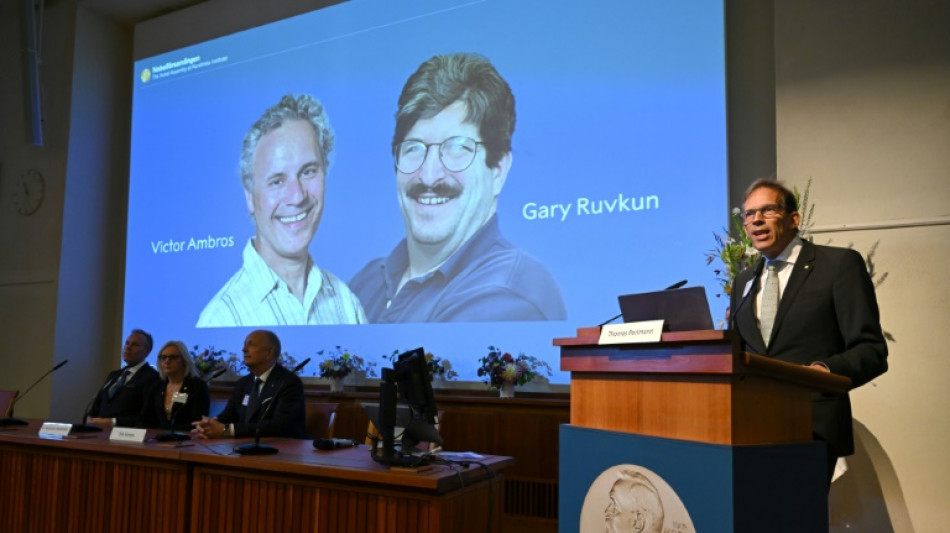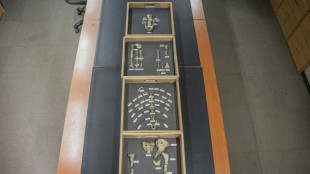
-
 Breyten Breytenbach, writer who challenged apartheid, dies at 85
Breyten Breytenbach, writer who challenged apartheid, dies at 85
-
Truce called after 82 killed in Pakistan sectarian clashes

-
 Salah wants Liverpool to pile on misery for Man City after sinking Saints
Salah wants Liverpool to pile on misery for Man City after sinking Saints
-
Berrettini takes Italy to brink of Davis Cup defence

-
 Lille condemn Sampaoli to defeat on Rennes debut
Lille condemn Sampaoli to defeat on Rennes debut
-
Leicester sack manager Steve Cooper

-
 Salah sends Liverpool eight points clear after Southampton scare
Salah sends Liverpool eight points clear after Southampton scare
-
Key Trump pick calls for end to escalation in Ukraine

-
 Tuipulotu try helps Scotland end Australia's bid for a Grand Slam
Tuipulotu try helps Scotland end Australia's bid for a Grand Slam
-
Davis Cup organisers hit back at critics of Nadal retirement ceremony

-
 Noel in a 'league of his own' as he wins Gurgl slalom
Noel in a 'league of his own' as he wins Gurgl slalom
-
A dip or deeper decline? Guardiola seeks response to Man City slump

-
 Germany goes nuts for viral pistachio chocolate
Germany goes nuts for viral pistachio chocolate
-
EU urges immediate halt to Israel-Hezbollah war

-
 Basel votes to stump up bucks to host Eurovision
Basel votes to stump up bucks to host Eurovision
-
Ukraine shows fragments of new Russian missile after 'Oreshnik' strike

-
 Six face trial in Paris for blackmailing Paul Pogba
Six face trial in Paris for blackmailing Paul Pogba
-
Olympic champion An wins China crown in style

-
 It's party time for Las Vegas victor Russell on 'dream weekend'
It's party time for Las Vegas victor Russell on 'dream weekend'
-
Norris applauds 'deserved' champion Verstappen

-
 Kohli blasts century as India declare against Australia
Kohli blasts century as India declare against Australia
-
Verstappen 'never thought' he'd win four world titles

-
 Former Masters champion Reed wins Hong Kong Open
Former Masters champion Reed wins Hong Kong Open
-
Awesome foursomes: Formula One's exclusive club of four-time world champions

-
 Smylie beats 'idol' Cameron Smith to win Australian PGA Championship
Smylie beats 'idol' Cameron Smith to win Australian PGA Championship
-
Five key races in Max Verstappen's 2024 title season

-
 Max Verstappen: Young, gifted and single-minded four-time F1 champion
Max Verstappen: Young, gifted and single-minded four-time F1 champion
-
'Star is born': From homeless to Test hero for India's Jaiswal

-
 Verstappen wins fourth consecutive Formula One world title
Verstappen wins fourth consecutive Formula One world title
-
Survivors, sniffing dogs join anti-mine march at Cambodia's Angkor Wat

-
 Far right eye breakthrough in Romania presidential vote
Far right eye breakthrough in Romania presidential vote
-
Jaiswal slams majestic 161 but Australia fight back in Perth

-
 Edinburgh's alternative tour guides show 'more real' side of city
Edinburgh's alternative tour guides show 'more real' side of city
-
IPL teams set to splash the cash at 'mega-auction' in Saudi Arabia

-
 Olympics in India a 'dream' facing many hurdles
Olympics in India a 'dream' facing many hurdles
-
Wounded Bangladesh protesters receive robotic helping hand

-
 Majestic Jaiswal 141 not out as India pile pain on Australia
Majestic Jaiswal 141 not out as India pile pain on Australia
-
Giannis, Lillard lead Bucks over Hornets as Spurs beat Warriors

-
 Juan Mata agent slammed as 'cowardly' by angry A-League coach
Juan Mata agent slammed as 'cowardly' by angry A-League coach
-
Marta inspires Orlando Pride to NWSL title

-
 Palestinian pottery sees revival in war-ravaged Gaza
Palestinian pottery sees revival in war-ravaged Gaza
-
Main points of the $300 billion climate deal

-
 Robertson wants policy change for overseas-based All Blacks
Robertson wants policy change for overseas-based All Blacks
-
Israel retreat helps rescuers heal from October 7 attack

-
 Afghan women turn to entrepreneurship under Taliban
Afghan women turn to entrepreneurship under Taliban
-
Mounting economic costs of India's killer smog

-
 At climate talks, painstaking diplomacy and then anger
At climate talks, painstaking diplomacy and then anger
-
Uruguayans head to polls with left hoping for comeback

-
 Trump's mass deportation plan could end up hurting economic growth
Trump's mass deportation plan could end up hurting economic growth
-
Iran director in exile says 'bittersweet' to rep Germany at Oscars


What is microRNA? Nobel-winning discovery explained
The Nobel Prize in Medicine was awarded on Monday to two US scientists for discovering microRNA, a previously unknown type of genetic switch which is hoped can pave the way for new medical breakthroughs.
But while several treatments and tests are under development using microRNAs against cancer, heart disease, viruses and other illnesses, none have actually yet reached patients.
And the world paid little attention when the new Nobel laureates Victor Ambros and Gary Ruvkun revealed their discovery decades ago, thinking it was just "something weird about worms", Cambridge University geneticist Eric Miska told AFP.
Here is an explainer about how exactly these tiny genetic switches work inside our bodies.
- What is microRNA? -
Each cell in the human body has the same set of instructions, called DNA. Some turn into brain cells, while others become muscles.
So how do the cells know what to become? The relevant part of the DNA's instructions is pointed to via a process called gene regulation.
Ribonucleic acid (RNA) normally serves as a messenger. It delivers the instructions from the DNA to proteins, which are the building blocks of life that turn cells into brains -- or muscles.
Miska gave the example of the messenger RNA vaccines rolled out against Covid-19 during the pandemic, which insert a message with new instructions to build proteins that block viruses.
But the two new Nobel winners Ambros and Ruvkun discovered a whole new type of gene regulator that had previously been overlooked by science.
Rather than being the messenger which relays information, microRNA instead acts as a switch to turn other genes off and on.
"This was a whole new level of control that we had totally missed," said Miska, who has worked on microRNA for two decades, including with the new Nobel laureates.
"The discovery of microRNAs brought an additional level of complexity by revealing that regions that were thought to be non-coding play a role in gene regulation," French researcher Benoit Ballester told AFP.
- What did the Nobel winners do? -
Back in the 1980s, Ambros and Ruvkun had been working separately on how genes interact in one-millimetre-long roundworms called C.elegans.
When they compared their work, it led to the discovery of microRNA. Ambros revealed the finding in a 1993 paper.
"Nobody really paid much attention," Miska said, explaining that most scientists at the time thought it only applied to worms.
Then in 2000, Ruvkun published research showing that microRNA is present right across the animal kingdom, including in humans and even some viruses.
"This was not just something weird that worms do, but in fact all animals and plants are totally dependent for development and normal function on them," Miska said.
More than a thousand genes that respond to microRNAs are now believed to be in the human body.
- How could this help us? -
There are numerous new treatments and tests using microRNA that are undergoing trials but none have been made widely available.
"Though there are no very clear applications available yet in microRNAs, understanding them, knowing that they exist, understanding their counter-regulatory networks, is always the first step," the Karolinska Institute's Gunilla Karlsson Hedestam told journalists in Stockholm.
MicroRNAs are particularly promising for fighting cancer because some of these switches "act as a tumour suppressor, so they put a brake on cells dividing inappropriately," Miska said.
Others, meanwhile, induce "cells to divide, which can lead to cancer", he added.
Because many viruses use microRNAs, several antiviral drugs are at varying stages of development, including for hepatitis C.
One complicating factor has been that microRNAs can be unstable.
But scientists also hope they can be used as a test called a "biomarker", which could reveal what type of cancer a patient could be suffering from, for example.
- What next? -
It also appears probable that microRNAs could be involved in the evolution of our species, Miska said.
While human brains are difficult to study, Miska hoped future research will discover more.
G.Machado--PC



